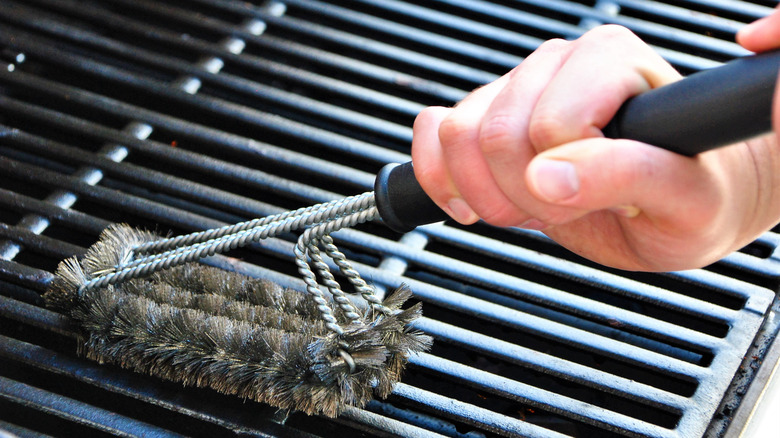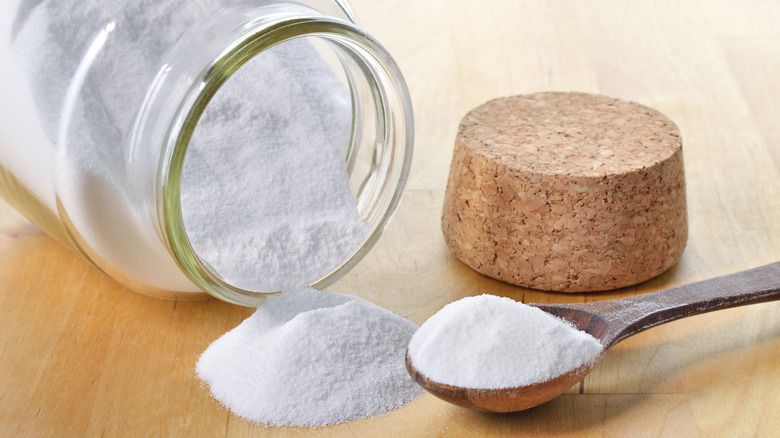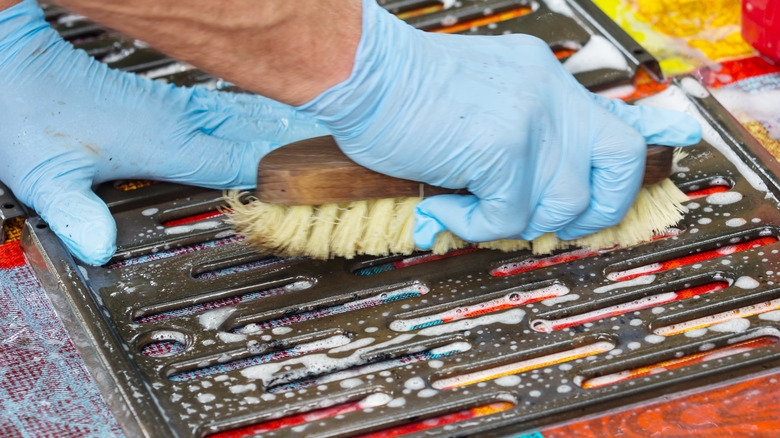Use This Kitchen Staple To Get Your Dirty Grill Grates Ready For Spring
There's nothing like the break in the cold temperatures to make you crave a good, freshly grilled burger, that is until you realize you never really cleaned the grates on the grill. The longer food residue remains on the grill grates, the more challenging it can be to remove. In an ideal world, you'll clean them properly and thoroughly before you tuck your grill away for the winter or your next use. If you did not do that, there may be something in your kitchen you can use to cut through the dirty grill grates quickly and easily.
Cleaning your grill grates in the spring means being able to throw spontaneous gatherings for friends on a random warm weekend. After a long winter of not using your barbecue, the dirt, debris, and grime have likely built up. Deep cleaning it now means it's ready for a summer full of great cooking.
It's worth putting on a coat and some gloves to head outside for this project. Just stop in the kitchen to grab the baking soda as you do. It's one of the simplest and most effective ways to pull that carbon and material off the surface of the grates without damaging them. This is one baking soda hack you can appreciate because it makes the job much easier.
Why baking soda is the best tool for cleaning dirty grill grates
Baking soda, or sodium bicarbonate, is a type of white, slightly gritty powder that typically works as a leavening agent in baking. It's also a fantastic household cleaner because of its ability to loosen the bind that dirt and debris have on surfaces, including those messy grill grates. When this alkaline substance is applied to the surface of the grill grate, it works to slowly and gently dissolve the material. It can remove grease, food particles, and buildup on the surface of the grates.
It has a slight abrasive quality to it as well, which helps with scrubbing the dirt up. However, it's not enough to damage the surface or create uneven grooves in it like more acidic-based cleaning agents or scouring pads. Another nice benefit is that it's a natural deodorizer as well, helping to get rid of any nasty lingering smells from those burnt burgers from last fall. There are no toxic fumes either, which is a better route to take than using many of the grill cleaners on the market that aren't exactly planet-friendly. Of course, baking soda is also a lot less expensive than any type of cleaning agent. Find it in your grocery store baking aisle for a few dollars.
One word of warning, though. There are some items you should never clean with baking soda, including aluminum, as it will cause it to oxidize. Be mindful of grills that may have aluminum components.
How to use baking soda to clean grill grates
Baking soda will do a lot of the work of cleaning the grill grates, but there are a few simple steps to keep in mind. Start with using a nylon bristle grill scrubbing brush. Make sure the brush itself is clean. You may need to consider other options for brushes as well based on the type of material the grate is made of. Then, you'll need to remove the grate from the grill, position it on the floor or in a deep sink where it's easy to scrub it, and rinse it with water. You don't have to get everything off just yet.
Sprinkle the baking soda over the top of the wet surface, covering as much of it as possible, especially areas where there's a buildup of material. Then, let it sit untouched for at least 10 minutes. This gives the baking soda time to start eating away at whatever is stuck on the grill grates.
The only thing you need to do then is use the brush to agitate the baking soda, scrubbing as much as necessary to fully remove the material from the grill grates. It should lift off more easily thanks to the dissolving action of the baking soda. Take your time moving over each of the grates to get into all of the grooves and lines. You can also use a scourer sponge to help wrap around each of the grill grate lines, scrubbing up and down them as you go. The final step is to rinse it off with water to remove all of the material. You can repeat the process if needed.


